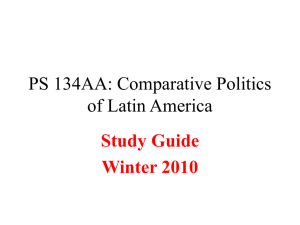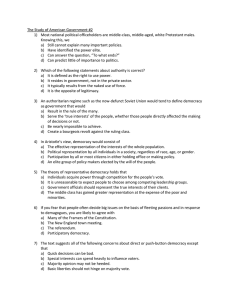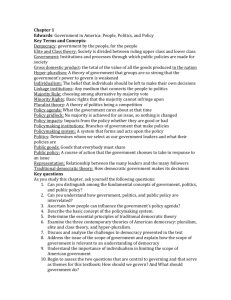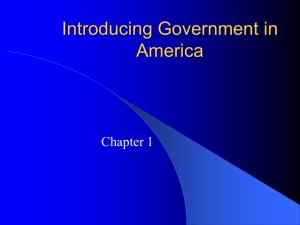CPO 4034 Jung Fall 2013 - Department of Political Science
advertisement
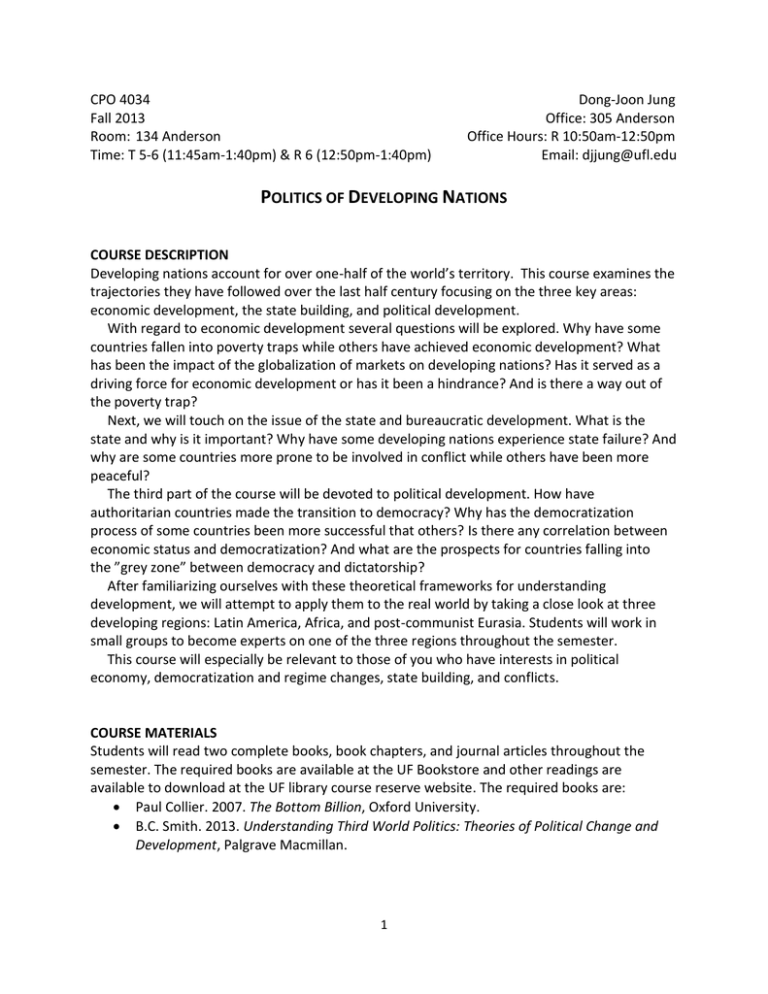
CPO 4034 Fall 2013 Room: 134 Anderson Time: T 5-6 (11:45am-1:40pm) & R 6 (12:50pm-1:40pm) Dong-Joon Jung Office: 305 Anderson Office Hours: R 10:50am-12:50pm Email: djjung@ufl.edu POLITICS OF DEVELOPING NATIONS COURSE DESCRIPTION Developing nations account for over one-half of the world’s territory. This course examines the trajectories they have followed over the last half century focusing on the three key areas: economic development, the state building, and political development. With regard to economic development several questions will be explored. Why have some countries fallen into poverty traps while others have achieved economic development? What has been the impact of the globalization of markets on developing nations? Has it served as a driving force for economic development or has it been a hindrance? And is there a way out of the poverty trap? Next, we will touch on the issue of the state and bureaucratic development. What is the state and why is it important? Why have some developing nations experience state failure? And why are some countries more prone to be involved in conflict while others have been more peaceful? The third part of the course will be devoted to political development. How have authoritarian countries made the transition to democracy? Why has the democratization process of some countries been more successful that others? Is there any correlation between economic status and democratization? And what are the prospects for countries falling into the ”grey zone” between democracy and dictatorship? After familiarizing ourselves with these theoretical frameworks for understanding development, we will attempt to apply them to the real world by taking a close look at three developing regions: Latin America, Africa, and post-communist Eurasia. Students will work in small groups to become experts on one of the three regions throughout the semester. This course will especially be relevant to those of you who have interests in political economy, democratization and regime changes, state building, and conflicts. COURSE MATERIALS Students will read two complete books, book chapters, and journal articles throughout the semester. The required books are available at the UF Bookstore and other readings are available to download at the UF library course reserve website. The required books are: Paul Collier. 2007. The Bottom Billion, Oxford University. B.C. Smith. 2013. Understanding Third World Politics: Theories of Political Change and Development, Palgrave Macmillan. 1 REQUIREMENTS (% of the final grade) Exams (2 × 25%): There will be two in-class exams (non-cumulative), each of which will account for 25% of the final grade. Exams will consist of multiple choice, short answer, short essay, and long essay questions. Students are required to bring their own Blue Books available at bookstores nearby to the exam. No make-up exams are allowed except in the case of an emergency that you can prove with official documentation. An alternative assignment which may be more difficult and in a different format will be given to those students with approved excuses. Region expert group presentation and report (25%): Students will be asked to submit their first and second preferences on which region out of the three developing areas (Latin America, Africa, and the post-communist region) they would like to become experts on. Upon the collected preferences, the instructor will divide students into nine groups, three of which will be assigned the same region. (No changes on the group members are allowed.) Students will work in a collaborative manner through regular meetings both inside of and outside of class hours, share the information with each other, discuss how the region has performed in terms of the three different issues of development (economic, state/bureaucracy, and political). To facilitate and aid the group work, this syllabus includes a list of academic readings focusing on each of the regions. These readings on each region are recommended for those who are not experts on the region, but required for the experts. Experts must cite at least some of those readings as the evidence of their arguments. Also, experts should catch up with the most up-to-date events and situations in the region through the semester using various sources available online and offline. Good group presentations and reports will include (1) a brief summary of how the region has performed in terms of the three development areas. Depending on the region, experts are allowed to focus more on one or two development areas than on the others. The judgment of the performance should be based on clear evidence you have found through various online and offline sources. The links provided at the back of this syllabus and the reading list included in the section of the region will serve as a good starting point to search for the evidence. It might be a good strategy to pick one or several countries as an example that supports for your argument. And then, (2) experts should select a few theories covered during the class and evaluate the extent to which those theories explain the empirical outcomes you have observed. Do they provide a good fit for the region, or not? If not, why did those theories fail to explain what is empirically found? In the end, (3) as a conclusion, you will need to provide a reflection on how the theories can be improved. That is, you should try to make your own hypotheses that can better explain what has been observed in the region. Presentation should take up 10 to 12 minutes followed by questions from the floor for around 10 minutes. Thus, up to 25 minutes will be given to each group’s presentation. Using visual aids such as Powerpoint slides will be helpful for a more effective presentation. In addition to the presentation, each group should hand in a group report that is 6 to 8 page long (except for the list of cited works, double-spaced, 12 point font, with normal margins) to the 2 instructor by 5:00 PM before the day of presentation. The report should contain what is covered by presentation, but must be put in more organized essay format. Each group member will be given the same grade for the group work first, and then the grade will be weighted according to in-group peer evaluation on your contribution to the group effort. An anonymous questionnaire will be distributed after the group presentations. Students who are judged to have done less than their fair share on the project by the other members of the group will be dropped a half grade. On the contrary, those who are judged to have done more than fair share will be granted an extra half grade. For instance, if the group is given B+, more-than-fair members will be graded A- and less-than-fair members will get B. Individual research paper (15%): This assignment involves picking one developing country that is familiar to you or captures your interest during the course, and analyzing the case in terms of one developmental issue (out of economic, state/bureaucracy, and political development). The country may or may not be the case in the region you expertise in the group work. Through this paper, students are required to link theories taught in the course to empirical country case using available online/offline data source and/or the arguments made by other scholarly works. Excellent papers should contain both in-depth understanding on the theories about the selected development issue and rich knowledge on the selected country. All in all, you can consider this a country-version expert report. The paper should be 4 to 5 pages long (not including the bibliography, double-spaced, 12 point font, with normal margin). It must be submitted to the instructor by 5:00 PM on December 6th. Attendance and participation (10%): Attendance and participation in in-class discussion is essential. An attendance sheet will be circulated every class and the total numbers of the present and signed students will be counted and compared to prevent any cheating on the attendance check. Please see the UF attendance policy: https://catalog.ufl.edu/ugrad/current/regulations/info/attendance.aspx Active involvement in in-class discussion is also important. In a normal situation, the twoperiod classes on Tuesday will be devoted to lectures where the instructor covers the basic theories and arguments of each week’s readings, and the one-period classes on Thursday will be spent discussing what is covered in the lecture, where students’ active participation is essential. GRADES Grading Scale: A = 90 or ABOVE A- = 87-89 B+ = 84-86 B = 80-83 B- = 77-79 C+ = 74-76 3 C = 70-73 C- = 67-69 D+ = 64-66 D = 60-63 D- = 57-59 E = 56 or BELOW Late policy: You will receive a full grade deduction from the grade designated for the assignment for the first day your submission is late. After that, you will receive a “half grade” deduction per day. So, if you hand in an assignment that would have earned a B+ one day late, you will receive a C+. If you hand in an assignment that would have earned a B+ two days late, you will receive a C, and so on. POLICIES Academic Honesty: All UF students promise to abide by the university’s Honor Code, which prevents students from receiving unauthorized aid on assignments. Plagiarism or other forms of unauthorized assistance may result in a failing grade on assignments. Please read the Student Honor Code for more information; http://www.dso.ufl.edu/sccr/honorcode.php Cell Phones: Cell phones must be on silent mode during class. Class lectures may not be taped without my permission. Disability Resource Center: Students with physical, learning, sensory or psychological disabilities should register with the Disability Resource Center: http://www.dso.ufl.edu/drc/ This center will then work with instructors to help accommodate the students (by providing note takers, extra time for exams). Please do this at the beginning of the semester, not right before the first exam, as it takes the center some time to make appropriate arrangements. COURSE SCHEDULE (SUBJECT TO CHANGE) Week 1 (August 22): Organizational meeting Distribution of syllabus, discussion of course and requirements I. Introduction Week 2 (August 27, 29): Breakouts: independence from colonialism and the breakdown of communism B.C. Smith. 2013. Understanding Third World Politics: Theories of Political Change and Development, Chapter 1. 4 Paul Collier. 2007. The Bottom Billion, Chapter 1. M. Steven Fish. 1995. Democracy from Scratch: Opposition and Regime in the New Russian Revolution, Princeton UP, Chapter 1. II. Economic development Week 3 (September 3, 5): The poverty trap: resource curse and dependency theory > September 5: In-class meetings with regional expert groups Paul Collier. 2007. The Bottom Billion, Chapter 3. Pauline Jones Luong. 2006. "Combating the Resource Curse: An Alternative Solution to Managing Mineral Wealth," Perspectives on Politics 4(1): 35-53. B.C. Smith. 2013. Understanding Third World Politics: Theories of Political Change and Development, Chapter 3. Recommended: Michael L. Ross. 2001. “Does Oil Hinder Democracy?,” World Politics 53:325-36. Benjamin Smith. 2004. “Oil Wealth and Regime Survival in the Developing World, 19601999,” American Journal of Political Science 48:232-246. Week 4 (September 10, 12): Globalization: Path to development or myth? Paul Collier. 2007. The Bottom Billion, Chapter 6. Joseph M. Grieco and G. John Ikenberry. 2002. State power and world markets : the international political economy, Chapters 7, 8. Week 5 (September 17, 19): Searching for the wayout Paul Collier. 2007. The Bottom Billion, Chapter 7 (also skim chapters 8-10). Joseph E. Stiglitz. 2002. Globalization and its discontents, Chapter 9. Recommended: Jeffrey. D. Sachs, "The Strategic Significance of Global Inequality," The Washington Quarterly (Summer 2001), pp.187-98. III. State development Week 6 (September 24, 26): The concept of the state > September 26: In-class meetings with regional expert groups B.C. Smith. 2013. Understanding Third World Politics: Theories of Political Change and Development, Chapters 4 and 6. Francis Fukuyama. 2004. State-Building: Governance and World Order in the 21st Century, Chapter 1. 5 Week 7 (October 1, 3): State failure in the third world Paul Collier. 2007. The Bottom Billion, Chapter 5. B.C. Smith. 2013. Understanding Third World Politics: Theories of Political Change and Development, Chapters 7 and 9. Week 8 (October 8, 10): What causes failure? Civil wars and international influence Paul Collier. 2007. The Bottom Billion, Chapters 2 and 4. B.C. Smith. 2013. Understanding Third World Politics: Theories of Political Change and Development, Chapter 8. Jeffrey S. Kopstein and David A. Reilly. 2000. “Geographic Diffusion and the Transformation of the Postcommunist World.” World Politics 53: 1-37. Week 9 (October 15, 17): Midterm Exam > October 17: In-class meetings with regional expert groups October 15 (Tue): Exam #1 IV. Political development Week 10 (October 22, 24): The Third wave B.C. Smith. 2013. Understanding Third World Politics: Theories of Political Change and Development, Chapter 10. Juan Linz and Alfred Stepan. 1996. Problems of Democratic Transition and Consolidation: Southern Europe, South America, and Post-Communist Europe. (Baltimore, Johns Hopkins University Press), Chapter 1. Juan Linz and Alfred Stepan. 1996. "Towards Consolidated Democracies," Journal of Democracy 7, 2. Week 11 (October 29, 31): Modernization theory Seymour Martin Lipset. 1959. "Some Social Requisites of Democracy: Economic Development and Political Legitimacy," American Political Science Review 53:69-105. Adam Przeworski and Fernando Limongi. 1997. “Modernization: Theories and Facts,” World Politics 49:155-183. Carles Boix and Susan Stokes. 2003. “Endogenous Democratization,” World Politics 55: 517-549. Ronald Inglehart and Christian Welzel. 2009. “How Development Leads to Democracy; What We Know About Modernization” Foreign Affairs March/April. Recommended: Mark J. Gasiorowski. 1995. “Economic Crisis and Political Regime Change: An Event History Analysis,” American Political Science Review 89: 882-897. 6 Bernhard, Michael, Christopher Reenock, and Timothy Nordstrom. 2003. “Economic Performance and Survival in New Democracies: Is There a Honeymoon Effect?” Comparative Political Studies 36: 404-431. Week 12 (November 5, 7): Grey zones: moving towards democracy or backlash? > November 7: In-class meetings with regional expert groups Andreas Schedler. 1998. “What is Democratic Consolidation?” Journal of Democracy 9:91-107. Steven Levitsky and Lucan Way. 2002. “The Rise of Competitive Authoritarianism,” Journal of Democracy 13:51-65. Thomas Carothers. 2002. “The End of the Transition Paradigm.” Journal of Democracy 13:5-21. Recommended: Jason Brownlee. 2009. “Portents of Pluralism: How Hybrid Regimes Affect Democratic Transitions ,” American Journal of Political Science 53: 515-532. V. Regional cases Week 13 (November 12, 14): Latin American region Recommended: Guillermo O'Donnell. 1978. "Reflections on the Patterns of Change in the Bureaucratic Authoritarian State," Latin American Research Review 13:1, 3-38. Terry Lynn Karl. 1990. "Dilemmas of Democratization in Latin America," Comparative Politics, 1-21. Guillermo O'Donnell. 1994. "Delegative Democracy," Journal of Democracy 5:1, 55-69. Consuelo Cruz and Rut C. Diamint. 1998. “The New Military Autonomy in Latin America,” Journal of Democracy 9:4. David S. Pion-Berlin. 2005. “Political Management of the Military in Latin America,” Military Review. Juan Linz. 1990. "The Perils of Presidentialism," Journal of Democracy, Vol. 1, No. 1. Matthew Shugart and Scott Mainwaring. 1997. "Presidentialism and Democracy in Latin America: Rethinking the Terms of the Debate," in (eds.) Scott Mainwaring and Matthew Shugart, Presidentialism and Democracy in Latin America, pp. 12-54. Philip Oxhorn and Graciela Ducatenzeiler. 1999. "The Problematic Relationship Between Economic and Political Liberalization," in Oxhorn and Starr (eds) Markets and Democracy in Latin America. Kurt Weyland. 2004. "Neoliberalism and Democracy in Latin America: A Mixed Record," Latin American Politics and Society 46:1. November 12: Latin America expert groups presentations 7 November 14: Review of the readings on Latin America Week 14 (November 19, 21): African region Recommended: Göran Hydén. 2013. African politics in comparative perspective. (Chp. 1,2,3,4 and 9) Jeffrey Herbst. 2000. States and Power in Africa: comparative lessons in authority and control. Princeton University Press (Read through Chp. 1-4 and 9, and skim 5-8) Paul Collier and Jan W. Gunning. 1999. “Why Has Africa Grown Slowly?” Journal of Economic Perspectives 13(3): 3-22. Nathan Jensen and Leonard Wantchekon. 2004. “Resource Wealth and Political Regimes in Africa,” Comparative Political Studies 37:816-841. Staffan Lindberg. 2006. Democracy and Elections in Africa. Baltimore, Johns Hopkins University Press. Robert Mattes and Michael Bratton. 2007. “Learning About Democracy in Africa.” American Journal of Political Science 51(1): 192-217 November 19: Africa expert groups presentations November 21: Review of the readings on Africa Week 15 (November 26, 28): Post-communist region Recommended: Michael McFaul. 2002. "The Fourth Wave of Democracy and Dictatorship: Noncooperative Transitions in the Postcommunist World," World Politics 54,2: 212-244. Valerie Bunce. 1995. "Comparing East and South," Journal of Democracy 6:3, 87-100. Hale, Henry E. 2005. “Regime Cycles: Democracy, Autocracy, and Revolution in PostSoviet Eurasia,” World Politics 58: 133-167. Steven Levitsky and Lucan Way. 2007. "Linkage, Leverage and the Post-Communist Divide," East European Politics and Societies 27: 21, 48-66. Vladimir Popov. 2004. "Circumstances versus Policy Choices: Why Has the Economic Performance of the Soviet Successor States Been So Poor?" in McFaul and Stoner-Weiss (eds.) After the Collapse of Communism: Comparative Lessons of Transition, pp. 96-129. Joel Hellman. 1998. "Winners Take All: The Politics of Partial Reform in Postcommunist Transitions" World Politics 50: 203-234. Andrew Barnes. 2003. "Comparative Theft: Context and Choice in the Hungarian, Czech, and Russian Transformations, 1989-2000," EEPS 17: 533–565. Conor O'Dwyer. 2004. "Runaway State-Building: How Political Parties Shape States in Postcommunist Eastern Europe," World Politics 56: 520-53. November 26: Post-communist expert groups presentations November 28: Thanksgiving holiday (No class) 8 VI. Wrapping up Week 16 (December 3, 5) December 3: Review of the readings on Post-communist countries / Exam review December 5: Reading day (No class) *** Individual research papers are due at 5:00 PM on December 6th. Week 17 (December 10): Final exam December 10 (Tue): Exam #2 9 GENERAL SOURCES Economic indicators: CIA, the World Factbook: https://www.cia.gov/library/publications/the-worldfactbook/index.html UN Statistical Databases: http://unstats.un.org/unsd/databases.htm The World Bank database: http://databank.worldbank.org/data/home.aspx The Heritage Foundation, Index of Economic Freedom: http://www.heritage.org/index/ Governance indicators: The Worldwide Governance Indicators (WGI) project: http://info.worldbank.org/governance/wgi/index.asp Transparency International, Corruption Perceptions Index: http://www.transparency.org/research/cpi/overview State Fragility Index and Matrix: http://www.systemicpeace.org/inscr/inscr.htm Armed Conflict Dataset (UCDP/PRIO): http://www.nsd.uib.no/macrodataguide/set.html?id=55&sub=1 Political indicators: Polity IV Project: http://www.systemicpeace.org/polity/polity4.htm Freedom House, Political Rights and Civil Liberties index: http://www.freedomhouse.org/report-types/freedom-world Database of Political Institutions: http://www.nsd.uib.no/macrodataguide/set.html?id=11&sub=1 LATIN AMERICA Note: The Latin American Collection is on the 4th Floor of Smathers Library. The Latin American Collection librarian is Paul Losch. UF’s Latin American Collection: http://uflib.ufl.edu/lac/ Links to Journals Covering Current Events in Latin America: http://uflib.ufl.edu/lac/currentevents.html Latin America Advisor: http://advisor.thedialogue.org/ Latin American Weekly Report http://www.latinnews.com/ NACLA http://tinyurl.com/32g3nn Academic Journals on Africa: Latin American Politics and Society: http://onlinelibrary.wiley.com/journal/10.1111/%28ISSN%291548-2456 Latin American Research Review: http://muse.jhu.edu/journals/lar/ 10 AFRICA Note: The African Studies Collection is located in Library West. The African Studies librarian is Dan Reboussin. UF’s African Studies Collection: http://guides.uflib.ufl.edu/african_studies Links to Journals Covering Current Events in Africa: Africa South of the Sahara Annual Encyclopedia: http://www.europaworld.com/entry/ass Doing Business in Africa: http://businesslibrary.uflib.ufl.edu/africa Africa Confidential: http://onlinelibrary.wiley.com/journal/10.1111/(ISSN)1467-6338 Academic Journals on Africa: African Affairs: http://afraf.oxfordjournals.org/content/by/year Journal of Modern African Studies: http://journals.cambridge.org/action/displayJournal?jid=MOA EASTERN EUROPE AND POST-SOVIET COUNTRIES Note: The Slavic and East European Studies Collection is located in Library West. The librarian is Alena Aissing. UF’s Slavic and East European Studies Studies Collection: http://guides.uflib.ufl.edu/content.php?pid=149189 Links to Journals Covering Current Events in Post-communist countries: Freedom House, Nations in Transit: http://www.freedomhouse.org/report-types/nationstransit European Bank for Reconstruction and Development (EBRD): http://www.ebrd.com/pages/homepage.shtml#&panel1-1 News Now_Eastern Europe: http://www.newsnow.co.uk/h/World+News/Europe/Eastern Bloomberg_Eastern Europe News: http://www.bloomberg.com/news/eastern-europe/ NY Times_Russia: http://topics.nytimes.com/top/news/international/countriesandterritories/russia/index.html Academic Journals on Post-communist countries: Communist and Post-Communist Studies: http://www.journals.elsevier.com/communist-andpost-communist-studies/ East European Politics & Societies: http://eep.sagepub.com/ Post-Soviet Affairs: http://www.bellpub.com/psa/ 11

